Premium Only Content
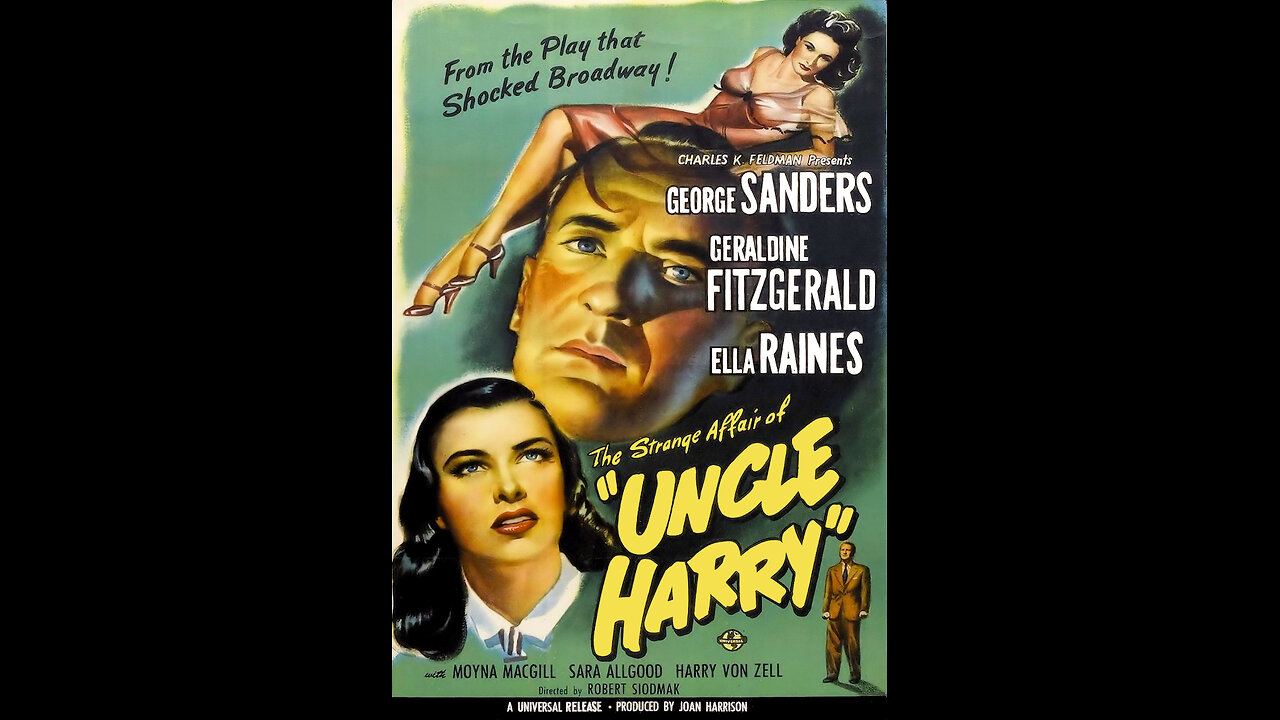
The Strange Affair of Uncle Harry (1945) | Director: Robert Siodmak
"The Strange Affair of Uncle Harry" (1945), directed by Robert Siodmak, is a psychological thriller and drama that delves into the complexities of family dynamics, love, and murder. The film is adapted from Thomas Job's play of the same name.
The story revolves around Harry Melville Quincey, played by George Sanders, a mild-mannered and introverted man who lives with his two sisters, Lettie (Geraldine Fitzgerald) and Hester (Moyna MacGill). Harry's life takes a turn when he becomes romantically involved with Deborah Brown, portrayed by Ella Raines. As Harry's relationship with Deborah blossoms, it stirs tension and jealousy within the Quincey household, leading to a series of dramatic events. The film takes a dark turn when Uncle Harry finds himself entangled in a web of suspicion and murder, forcing him to confront his own choices and desires.
Film Noir Elements: "The Strange Affair of Uncle Harry" incorporates elements of film noir, characterized by its moody lighting, shadowy visuals, and a narrative that explores the darker aspects of human nature. The film uses noir aesthetics to heighten the psychological tension within the story.
George Sanders's Performance: George Sanders delivers a nuanced performance as Uncle Harry, capturing the character's internal conflicts and vulnerabilities. Sanders portrays the complexity of a man torn between societal expectations, family dynamics, and his own desires.
Exploration of Psychological Themes: The film explores psychological themes, including the impact of familial relationships on individual well-being and the consequences of suppressed desires. Harry's internal struggles and the psychological tension between characters contribute to the film's depth.
Geraldine Fitzgerald's Jealousy: Geraldine Fitzgerald's portrayal of Lettie, Harry's possessive and jealous sister, adds a layer of intensity to the narrative. The dynamics between Lettie and Deborah create a palpable sense of unease and contribute to the film's suspense.
Cinematic Style: Director Robert Siodmak employs a visually compelling and atmospheric style, using lighting and composition to heighten the emotional impact of key scenes. The film's noir-influenced cinematography enhances its overall mood and tone.
Themes of Love and Betrayal: At its core, the film explores themes of love, betrayal, and the consequences of societal expectations. The romantic subplot between Harry and Deborah serves as a catalyst for the unfolding drama, challenging traditional notions of morality.
Narrative Twists and Turns: "The Strange Affair of Uncle Harry" keeps audiences engaged with its unpredictable plot twists and turns. The suspenseful storytelling adds to the film's intrigue, keeping viewers guessing until the final revelation.
Legacy and Critical Reception: While not widely recognized upon its initial release, the film has gained appreciation over the years for its atmospheric storytelling and psychological depth. It is now considered a noteworthy entry in the film noir genre.
In conclusion, "The Strange Affair of Uncle Harry" (1945) stands as a compelling exploration of psychological drama within the framework of film noir. With strong performances, atmospheric cinematography, and a narrative that delves into complex human emotions, the film remains a notable contribution to the noir genre and a thought-provoking piece of classic cinema.
Stars:
George Sanders as Harry Melville Quincey
Ella Raines as Deborah Brown
Geraldine Fitzgerald as Lettie Quincey
Sara Allgood as Nona
Moyna MacGill as Hester Quincy
Samuel S. Hinds as Dr. Adams
Harry Von Zell as George Wright
Craig Reynolds as Police Sgt. Haggerty
Eily Malyon as Edwina Collins
-
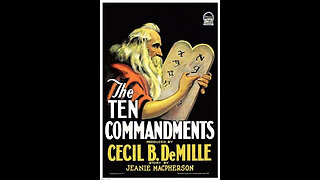 2:16:12
2:16:12
Classic Films & Movies Archive
8 days agoThe Ten Commandments (1923) | Directed by Cecil B. DeMille
128 -
 LIVE
LIVE
BSparksGaming
11 hours agoDonkey Kong BONANZA Walkthrough Gameplay! (Part 2)
126 watching -
 LIVE
LIVE
LFA TV
21 hours agoLFA TV ALL DAY STREAM - FRIDAY 7/18/25
615 watching -
 LIVE
LIVE
SilverFox
5 hours ago🔴LIVE - Fortnite - Maybe ABI Later + FoxChat DOUBLE XP
79 watching -
 1:21:58
1:21:58
Kim Iversen
7 hours ago"There Is No Death": What This Man Saw Outside His Body Will Blow Your Mind
84.3K60 -
 5:28:42
5:28:42
Dr Disrespect
8 hours ago🔴LIVE - DR DISRESPECT - NEW AAA BATTLE ROYALE ON UNREAL ENGINE 5 #OTG #OFFTHEGRID
156K16 -
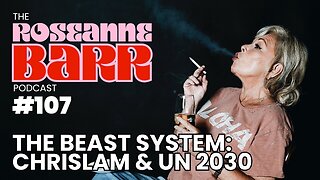 1:13:38
1:13:38
Roseanne Barr
7 hours agoThe Beast System: Chrislam & UN 2030 | The Roseanne Barr Podcast #107
52K57 -
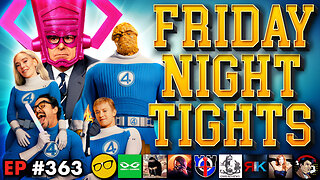 3:40:13
3:40:13
Nerdrotic
5 hours ago $6.12 earnedLate Night CANCELLED, Taika WOKEtiti DREDD, Absolute STATE of Superheroes! | Friday Night Tights 363
44K8 -
 1:21:02
1:21:02
vivafrei
6 hours agoLive with Vince Coglianese! Not Just the Epstein Stuff... Let's Talk About Some Trump Wins!
101K48 -
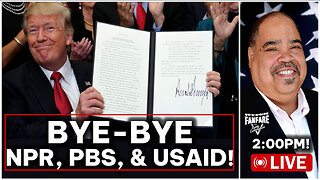 2:52:15
2:52:15
Barry Cunningham
6 hours agoWATCH LIVE: PRESIDENT TRUMP SIGNS LAWS ON CRYPTO AND ENDS NPR, PBS, & USAID!
52.7K31